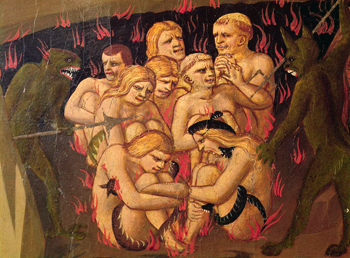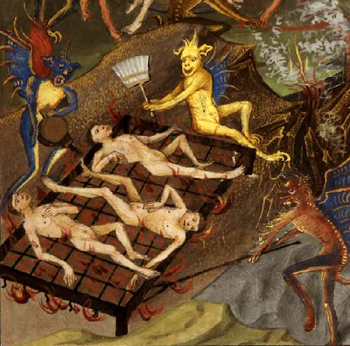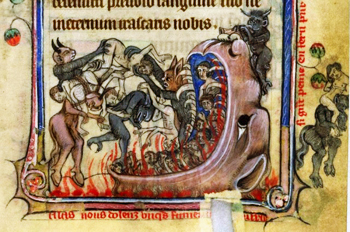Faith under Attack
 |
 |
 |
 |
 |
 |
 |
The Dogma of Hell – Part II
The Pains Inflicted on the Reprobates in Hell
Hell was revealed by Our Lord as many as 50 times in the Gospel, as we saw in the previous article. Here we will examine the pains of Hell, how Catholics should think about Hell, the salutary fear of it we should have, and how it should influence our daily actions.
Predominant in the words of Sacred Scripture about Hell is the terrible torture of fire. The Scriptures call Hell a “pool of sulfur and fire,” “the Gehenna of fire,” “the eternal fire,” and a “fiery furnace where the fire shall never be extinguished.”
 “The fire of Hell is a real fire,” Fr. François Xavier Schouppe affirms in his book The Dogma of Hell Illustrated by Facts taken from Profane and Sacred History.
“The fire of Hell is a real fire,” Fr. François Xavier Schouppe affirms in his book The Dogma of Hell Illustrated by Facts taken from Profane and Sacred History.
“It is a fire that burns like this world’s fire, although it is infinitely more active. Must there not be a real fire in Hell, seeing that there is a real fire in Purgatory?” (1)
“It is the same fire,” says St. Augustine, “that tortures the damned and purifies the elect.” (2)
The horrific agony of being consumed by fire on earth ends when the fire consumes the person. But in Hell the anguish of the pains of fire never ceases, since the fire there burns but does not consume. That is why it is good for us to think about Hell as a means to encourage us to give up the guilty pleasures, friendship and attachments that are leading us there.
Just the sight of a soul that falls into Hell causes incomparable pain. St. Margaret Mary Alacoque beheld the apparition of one of her sisters in religion who had recently died. That sister told St. Margaret Mary that she was suffering cruelly in Purgatory and implored her prayers and suffrages.
“See the bed I lie on,” she said to St. Margaret, “where I am enduring intolerable pains.”
“I saw that bed,” the Saint reported in her writings, “and it still makes me shudder. It was bristling with sharp and fiery spikes that entered the flesh. The deceased told me she was suffering this torture for her sloth and negligence in observing the rule.”
“But this is not all,” continued the sister. “My heart is torn in my bosom to punish my murmurs against my superiors. My tongue suffers pain for my words contrary to charity and my breaches of silence. But all this is a small matter in comparison with another pain that God made me experience. Although it did not last long, it was more painful to me than all my sufferings.”
Then she told St. Margaret Mary that God had showed her one of her female relatives who had died in a state of mortal sin sentenced by the Supreme Judge and dashed into Hell, a sight that caused her such fright, horror and pain that no words could describe it. (3)
 This is just one report. Fr. Schouppe presents many horrible accounts of both religious and laity revealing the horrors of Hell. One short incidence involved a holy priest exorcising a possessed man. During the exorcism, he asked the Devil what pains he had in Hell. He answered, “An eternal fire, an eternal malediction, an eternal rage and a frightful despair at never being able to gaze upon the One who created me.”
This is just one report. Fr. Schouppe presents many horrible accounts of both religious and laity revealing the horrors of Hell. One short incidence involved a holy priest exorcising a possessed man. During the exorcism, he asked the Devil what pains he had in Hell. He answered, “An eternal fire, an eternal malediction, an eternal rage and a frightful despair at never being able to gaze upon the One who created me.”
On a similar occasion, the exorcist inquired of the Devil what his greatest pain was. He replied with a tone of indescribable despair: "Always, always! Never, never!" (4)
Another suffering of Hell is the corporal stench, which is more insupportable than the stench of corpses. If the body of a damned person, says St. Bonaventure, were deposited on the earth, which, of itself alone, would be sufficient to make the earth uninhabitable. It would fill earth with its stench and infection, as a corpse left to rot in a house would spread its unbearable stench throughout it. (5)
Toward the end of the life of St. Martin of Tours, the Devil came to tempt him under a visible form. The spirit of lies appeared before him with royal magnificence, a crown of gold on his head, and said he was the King of Glory, the Son of God. The holy Bishop recognized the tempter under these appearances of human grandeur and chased him away with contempt. Proud Satan was confounded; he disappeared. But he left the room filled with a foul stench so terrible that the Saint could not remain there any longer.
Think on Hell to avoid falling into it
A reader may object: “What is the point of hearing all these terrifying stories? It is better to think on the goodness and mercy of God.”
It is not difficult to respond. Before Vatican II, confessors used to tell stories like these from the pulpit and encourage persons to think about the torments of Hell to prevent us from falling into it. It is very easy to be damned and the damned are very numerous.
St. Teresa of Avila compares those lost souls to the snowflakes that fall in winter, so numerous are they. (6)
A Bishop, by special permission of God, received a visit from a sinner who had died impenitent a short time before. This damned soul asked the Bishop if there were still any men on earth. Then, he explained: “Since I have been in this woebegone abode, I have seen such a prodigious multitude arrive that I am at a loss to conceive that there are men still on earth." (7)
Indeed, we are warned exactly this in the Gospel. "Enter ye in at the narrow gate; for wide is the gate, and broad is the way that leads to destruction, and many there are who go in there. How narrow is the gate and straight is the way that leads to life; and few there are that find it" (Mt 7:13-14).
To avoid Hell, it is vital to avoid the road to it. For this, we must avoid it under all its forms and strive to remain always in the state of grace.
Whoever thinks of Hell is on the road to avoiding it. For, in the time of temptation, this thought will help him not to sin. We have the example of St. Martinian, a hermit of Caesarea in Palestine in the 4th century. He had lived 25 years in solitude when God allowed his fidelity to be put to a violent test.
 One day, a courtesan named Zoe disguised as a mendicant, came to his cell during a rain storm and begged shelter. The holy anchorite took her in and lit a fire for her to dry her garments. But the prostitute, casting off her borrowed ragged cloak, appeared now in a seductive dress and began to apply all her fascinating charms.
One day, a courtesan named Zoe disguised as a mendicant, came to his cell during a rain storm and begged shelter. The holy anchorite took her in and lit a fire for her to dry her garments. But the prostitute, casting off her borrowed ragged cloak, appeared now in a seductive dress and began to apply all her fascinating charms.
When he realized how tempted he was, Martinian sat before the fire and put his bare feet into it before the eyes of the astonished courtesan. The pain drew cries from him, but he cried out: "Alas, my soul, if you cannot bear so weak a fire now, how will you be able to bear the fire of Hell?"
The temptation was overcome, Zoe was converted and later became a nun in Bethlehem. Such was the salutary effect of the thought of Hell.
The society of the devils is horrendous
Another torture of Hell is the horrible society of the devils and the damned. Some foolish souls make light of this aspect and even joke about it, saying: “Well, at least I will not be there alone.” In reality, they will find no consolation, but the misery of convicts sentenced to wear irons together in the galleys. But even a convict can find a certain consolation in the company of other human beings. Not so in Hell, where the damned are mutual torturers.
St. Thomas says: “In Hell the associates of a damned soul, far from alleviating his suffering, will make it more intolerable for him.” (8) Even the society of those persons who were his dearest friends is insupportable to the damned soul in Hell.
In Hell the damned souls weep for the time they lost in vain amusements, for omitting their Sunday obligation to attend Mass, for an intentionally non-confessed mortal sin. Then, they long to return for one hour to make a good confession, but to no avail. The time on earth allotted to them by God is over, and now they must face the consequence that lasts an eternity.
Fr. Schouppe tells us a true story that we would do well to ponder long and hard.
A priest, finding himself in a secluded place where he retired to pray, heard mournful wails, which could proceed only from a supernatural cause. He demanded who were the authors of these piteous cries and what they meant.
Then, a sad voice replied to him: "We are the damned. Let it be known that we are deploring in Hell the time lost, the precious time that we wasted on earth in vanities and crime. Ah! One hour would have given us what an eternity can restore to us no more." (9)
Continued

Predominant in the words of Sacred Scripture about Hell is the terrible torture of fire. The Scriptures call Hell a “pool of sulfur and fire,” “the Gehenna of fire,” “the eternal fire,” and a “fiery furnace where the fire shall never be extinguished.”

The fire of Hell is a real fire
“It is a fire that burns like this world’s fire, although it is infinitely more active. Must there not be a real fire in Hell, seeing that there is a real fire in Purgatory?” (1)
“It is the same fire,” says St. Augustine, “that tortures the damned and purifies the elect.” (2)
The horrific agony of being consumed by fire on earth ends when the fire consumes the person. But in Hell the anguish of the pains of fire never ceases, since the fire there burns but does not consume. That is why it is good for us to think about Hell as a means to encourage us to give up the guilty pleasures, friendship and attachments that are leading us there.
Just the sight of a soul that falls into Hell causes incomparable pain. St. Margaret Mary Alacoque beheld the apparition of one of her sisters in religion who had recently died. That sister told St. Margaret Mary that she was suffering cruelly in Purgatory and implored her prayers and suffrages.
“See the bed I lie on,” she said to St. Margaret, “where I am enduring intolerable pains.”
“I saw that bed,” the Saint reported in her writings, “and it still makes me shudder. It was bristling with sharp and fiery spikes that entered the flesh. The deceased told me she was suffering this torture for her sloth and negligence in observing the rule.”
“But this is not all,” continued the sister. “My heart is torn in my bosom to punish my murmurs against my superiors. My tongue suffers pain for my words contrary to charity and my breaches of silence. But all this is a small matter in comparison with another pain that God made me experience. Although it did not last long, it was more painful to me than all my sufferings.”
Then she told St. Margaret Mary that God had showed her one of her female relatives who had died in a state of mortal sin sentenced by the Supreme Judge and dashed into Hell, a sight that caused her such fright, horror and pain that no words could describe it. (3)

All the senses are tormented by the devils in Hell
On a similar occasion, the exorcist inquired of the Devil what his greatest pain was. He replied with a tone of indescribable despair: "Always, always! Never, never!" (4)
Another suffering of Hell is the corporal stench, which is more insupportable than the stench of corpses. If the body of a damned person, says St. Bonaventure, were deposited on the earth, which, of itself alone, would be sufficient to make the earth uninhabitable. It would fill earth with its stench and infection, as a corpse left to rot in a house would spread its unbearable stench throughout it. (5)
Toward the end of the life of St. Martin of Tours, the Devil came to tempt him under a visible form. The spirit of lies appeared before him with royal magnificence, a crown of gold on his head, and said he was the King of Glory, the Son of God. The holy Bishop recognized the tempter under these appearances of human grandeur and chased him away with contempt. Proud Satan was confounded; he disappeared. But he left the room filled with a foul stench so terrible that the Saint could not remain there any longer.
Think on Hell to avoid falling into it
A reader may object: “What is the point of hearing all these terrifying stories? It is better to think on the goodness and mercy of God.”
It is not difficult to respond. Before Vatican II, confessors used to tell stories like these from the pulpit and encourage persons to think about the torments of Hell to prevent us from falling into it. It is very easy to be damned and the damned are very numerous.
St. Teresa of Avila compares those lost souls to the snowflakes that fall in winter, so numerous are they. (6)
A Bishop, by special permission of God, received a visit from a sinner who had died impenitent a short time before. This damned soul asked the Bishop if there were still any men on earth. Then, he explained: “Since I have been in this woebegone abode, I have seen such a prodigious multitude arrive that I am at a loss to conceive that there are men still on earth." (7)
Indeed, we are warned exactly this in the Gospel. "Enter ye in at the narrow gate; for wide is the gate, and broad is the way that leads to destruction, and many there are who go in there. How narrow is the gate and straight is the way that leads to life; and few there are that find it" (Mt 7:13-14).
To avoid Hell, it is vital to avoid the road to it. For this, we must avoid it under all its forms and strive to remain always in the state of grace.
Whoever thinks of Hell is on the road to avoiding it. For, in the time of temptation, this thought will help him not to sin. We have the example of St. Martinian, a hermit of Caesarea in Palestine in the 4th century. He had lived 25 years in solitude when God allowed his fidelity to be put to a violent test.

Great is the number of souls that enter the mouth of Hell
When he realized how tempted he was, Martinian sat before the fire and put his bare feet into it before the eyes of the astonished courtesan. The pain drew cries from him, but he cried out: "Alas, my soul, if you cannot bear so weak a fire now, how will you be able to bear the fire of Hell?"
The temptation was overcome, Zoe was converted and later became a nun in Bethlehem. Such was the salutary effect of the thought of Hell.
The society of the devils is horrendous
Another torture of Hell is the horrible society of the devils and the damned. Some foolish souls make light of this aspect and even joke about it, saying: “Well, at least I will not be there alone.” In reality, they will find no consolation, but the misery of convicts sentenced to wear irons together in the galleys. But even a convict can find a certain consolation in the company of other human beings. Not so in Hell, where the damned are mutual torturers.
St. Thomas says: “In Hell the associates of a damned soul, far from alleviating his suffering, will make it more intolerable for him.” (8) Even the society of those persons who were his dearest friends is insupportable to the damned soul in Hell.
In Hell the damned souls weep for the time they lost in vain amusements, for omitting their Sunday obligation to attend Mass, for an intentionally non-confessed mortal sin. Then, they long to return for one hour to make a good confession, but to no avail. The time on earth allotted to them by God is over, and now they must face the consequence that lasts an eternity.
Fr. Schouppe tells us a true story that we would do well to ponder long and hard.
A priest, finding himself in a secluded place where he retired to pray, heard mournful wails, which could proceed only from a supernatural cause. He demanded who were the authors of these piteous cries and what they meant.
Then, a sad voice replied to him: "We are the damned. Let it be known that we are deploring in Hell the time lost, the precious time that we wasted on earth in vanities and crime. Ah! One hour would have given us what an eternity can restore to us no more." (9)
Continued
- Francois Xavier Schouppe, The Dogma of Hell, Illustrated by Facts Taken from Profane and Sacred History, Rockford, IL: TAN, 1989, p. 21
- Ibid.
- Ibid., pp. 25-26.
- Ibid., p. 31
- Ibid., p. 30
- Ibid., p. 34
- Ibid.
- St. Thomas Aquinas, Summa Theologica, Suppl. 9, 86, A.1., apud F.X. Schouppe, The Dogma of Hell, pp. 30-31.
- F.X. Schouppe, The Dogma of Hell, p. 34

Posted April 16, 2014
______________________
______________________





